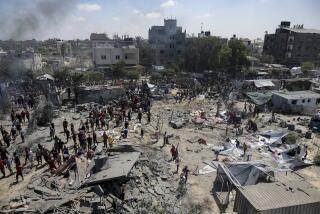Bosnian Talks in Jeopardy After Slaying
- Share via
GENEVA — Peace talks seen as the last chance for a diplomatic settlement to the Bosnian war were in danger of collapsing Saturday night after the assassination of a top Bosnian politician in Sarajevo.
Bosnian President Alija Izetbegovic, reacting to the killing of his deputy prime minister by a Serbian gunman in the Bosnian capital Friday, said that U.N.-brokered peace talks in Geneva would be suspended in protest.
Nonetheless, he told the television network France 2 during a stop in Paris amid a diplomatic shuttle mission that he would travel to Geneva as originally planned today. He did not specify what he would do there, but his presence could leave room for possible progress.
In Belgrade, Yugoslavia, a federal government spokesman said that bad weather in Switzerland had prevented several principals in the negotiations from leaving for Geneva, postponing until Monday the next possible round of talks. But Serbian President Slobodan Milosevic, accused by much of the world of instigating the fighting in Bosnia, is expected to arrive in Geneva today with Yugoslav President Dobrica Cosic.
With demands for international military intervention increasing, mediators have told the Serbs that the talks are a final chance for a settlement. But the murder of Bosnian Deputy Prime Minister Hakija Turajlic has cast a shadow over the negotiations.
Turajlic was killed Friday afternoon as he was returning to Sarajevo from the U.N.-controlled airport in a French armored personnel carrier. The vehicle was stopped at an illegal roadblock by about 40 soldiers of the Bosnian Serb army, and after a nearly two-hour standoff, a Serbian soldier pushed aside a French officer and fired at least seven shots at Turajlic, killing him.
The French armored personnel carrier was traveling on a nominally demilitarized road that the Serbs had agreed, in writing, would be controlled by the United Nations. The Serbs are not allowed to set up checkpoints on the road or inspect vehicles on it--but they frequently do, and the United Nations has not forced them back into their barracks.
When the French vehicle was stopped less than 400 yards from the headquarters of the well-armed French battalion, the French officer who took charge of the negotiations refused to call for help.
“We always make the same mistake,” a disgruntled U.N. staff officer said. “We negotiate. But the only way to negotiate with the Serbs is, if they have two APCs, then we bring 50 of our own.”
The Bosnian Serb military commander, Gen. Ratko Mladic, told reporters in Serb-controlled northeast Bosnia that the slaying was the work of “nervous” soldiers and would be investigated.
The U.N. commander in Bosnia admitted Saturday that his soldiers had failed to provide adequate security for Turajlic.
Gen. Philippe Morillon, looking weary and trembling at times, acknowledged in Sarajevo that “some more precautions” should have been taken and described Friday’s assassination as a “tragedy, naturally, of errors.” But the French general, speaking at a heated press conference, dodged questions about who committed the errors.
The Bosnian presidency and government, in a statement in Sarajevo late Saturday, blamed Morillon and other U.N. officers for Turajlic’s death.
As the fingers pointed, about 300 people gathered Saturday at an ancient Muslim cemetery next to the Bosnian presidency building in Sarajevo for Turajlic’s funeral.
Vice President Ejup Ganic shoveled the first pile of earth onto the coffin while Turajlic’s wife and two daughters looked on in tears. Automatic gunfire rattled from the hills overlooking the city.
White House Press Secretary Marlin Fitzwater said Saturday that the United States was “outraged” by the killing. “This heinous act of violence and demonstrated disdain for the authority of the United Nations deserves the opprobrium of the world,” he said.
The United States has been leading the effort to get the United Nations to back up its “no-fly zone” over Bosnia with force.
In London, the Sunday Times reported today that Britain is preparing contingency plans to evacuate its 2,400 troops from Bosnia if the United Nations enforces the no-fly zone over Bosnia and a Serbian aircraft is shot down.
“As soon as the shooting starts, that is the end of the relief operation,” a source at the Foreign Office was quoted as saying.
Britain sent the troops to Bosnia to aid U.N. humanitarian efforts.
The Sunday Times said the United Nations was expected to issue a new resolution this week giving the Serbs 30 days to comply with the no-fly zone or risk attack.
In yet another twist to the efforts to find peace in war-torn Bosnia, the Bosnian Serbs’ self-proclaimed Parliament, meeting in Bijeljina, on Saturday rejected the peace plan offered by international mediators Cyrus R. Vance and Lord Owen in Geneva.
The plan does not give Serbs what they have been demanding: their own boundaries in Bosnia and the right to self-determination. The mediators and Izetbegovic’s government reject ethnic separation.
More to Read
Sign up for Essential California
The most important California stories and recommendations in your inbox every morning.
You may occasionally receive promotional content from the Los Angeles Times.










